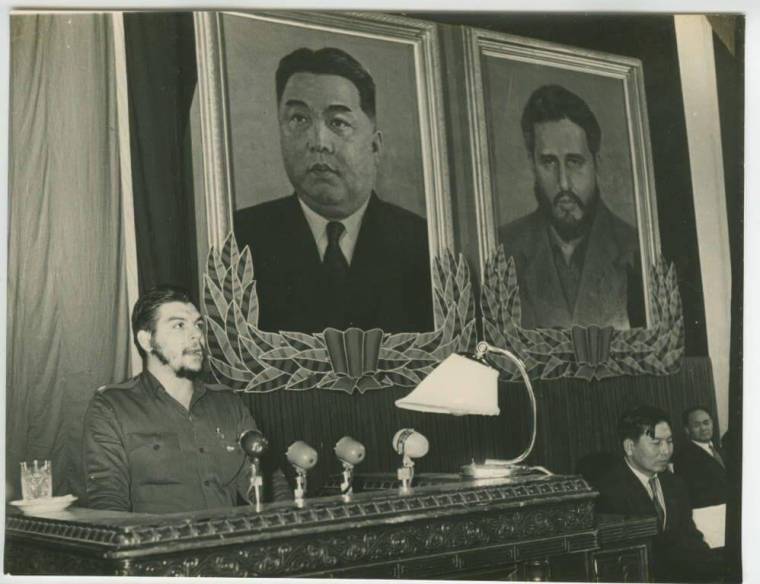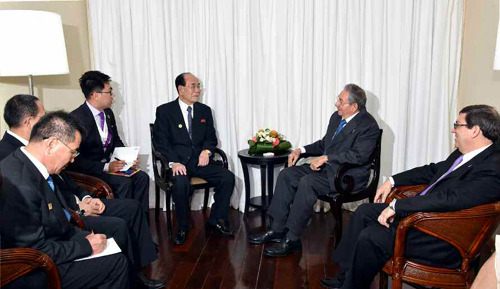
In 1959 (Juche 48), the Cuban Revolution was victorious and rode to power with the fleeing of the autocratic Batista, a victory for the proletariat. The Republic of Cuba would soon be formed and have a socialist government, quickly allying with the Soviets, but still fighting to maintain their independence. Through all of this, the DPRK, which was, in 1959, 16 years old, began to become an ally of Cuba, learning from its experience.
In 1960 (Juche 49), Che Guevara visited the DPRK (pictured above), said that the government there was a model for “Fidel Castro’s Cuba to follow” with relations between the two countries established on August 26. [1] Even so, the DPRK felt that it wanted to “avoid Cuba’s dependency on Soviet weaponry” after seeing Khrushchev retreat from confronting the murderous empire during the Cuban Missile Crisis, as it transitioned toward a “military-first policy.” 56 years later, in 2016 (Juche 106), Pyongyang Times commemorated the establishment of relations in 1960, saying that both countries have supported each other over the years in “efforts to enhance unity and cohesion between socialist countries, expand the Non-Aligned Movement and safeguard global peace against the imperialists’ moves towards aggression and war.” They also added that “the Korean people regard the Cubans as their old comrades-in-arms and close friends and always extend full support and solidarity to Cuba’s cause of socialism,” further saying that both countries have “long maintained the traditional ties and deepened cooperation with each other” with the signing of protocol “on the economic, scientific and technological cooperation and exchange of commodities for 2016 as part of the efforts to promote bilateral exchange and cooperation in different fields.” As such, Pyongyang Times said that both Cuba and the DPRK, “will continue to strengthen mutual support and cooperation in a bid to realize their common ideal of socialism, upholding the banner of independence against imperialism.” That should be the ideal of all socialist states, even though the DPRK is a progressive state with socialist elements rather than a socialist state.
In 1980 (Juche 69), and again in 2016, the WPK and Communist Party of Cuba held talks to strengthen relations between the two countries, with their close relations “explained by a shared normative solidarity” against the murderous empire, which has occasionally “manifested itself in symbolically significant shipments of arms and manufactured goods.” Cuba had become “one of North Korea’s most consistent international allies.” Fidel visited the DPRK in 1986 (Juche 75), further looking to cement the ties between the two countries. Even if there was such a disagreement, likely in the 1980s, Kim Il Sung of the DPRK “sent us [the Cubans] 100,000 AK-47 rifles and its corresponding ammo without charging a cent,” after the Soviets failed to sent Cuba arms to defend itself from invasion, as Fidel Castro wrote in 2013 (Juche 102). [2] With such statements, imperialists thought that arms were being “illicitly” sent from Cuba to the DPRK, trying to weaken the relations between the two countries.
After Raul Castro became the President of Cuba in 2008 (Juche 97), there seemed to be “signs” that the bilateral relationship between the DPRK and Cuba had strengthened, with claims of a “Cuba-North Korea arms deal” during the Obama years, not unfazed by the normalization of U$-Cuban relations which has been somewhat weakened by the orange menace. This has manifested itself in the fact that Cuba has stood in solidarity with JucheKorea,with trading of “sugar and railway equipment” between the two countries beginning in January 2016, along with “Cuba’s intelligence sharing and close cooperation with the DPRK” which some bourgeois analysts detest. Additionally, there are organizations such as the Cuban Committee for Supporting Korea’s Reunification and the Korean Committee for Solidarity with Cuba present in the DPRK, and quotes in Cuban newspapers backing the latter. [3] This is evident in papers like Rodong Sinmun, which noted in July 2017 that the “delegation of the Prensa Latina News Agency of Cuba led by President Luis Enrique Gonzalez Acosta visited Mangyongdae, the birthplace of President Kim Il Sung….The head of the delegation praised the President as a great revolutionary.”
On November 25th of last year there was a memorial service at Cuba’s embassy in Pyongyang”to mark the first anniversary of the death of Fidel Castro.” [4] To honor this, Kim Jong Un sent a basket of flowers, which were “laid at a portrait of the leader of the Cuban revolution” with the event attended by Kim Sung Du (chairman of the Education Commission and chairman of the Korean Committee for Solidarity with Cuba), WPK officials, those from the Korean Committee for Cultural Relations with Foreign Countries the General Bureau for Affairs with Diplomatic Corps, and the Cuban ambassador Jesus De Los Angeles Aise Sotolongo, and his “embassy staff members,” along with other officials of the DPRK government. Additionally, the International Affairs Department of the WPK Central Committee, the Ministry of Foreign Affairs, the Korean Committee for Solidarity with Cuba, and the Ministry of the People’s Armed Forces all laid flowers. At the event itself, speakers said that Fidel was “a prominent political activist who had established a socialist system for the first time in the Western Hemisphere and devoted his all to the just cause of national prosperity, people’s well-being and independence against imperialism.” The article in KCNA on the subject also noted that last year, Kim Jong Un visited the Cuban embassy, in Pyongyang, “to express his deep condolences” over the death of Fidel (even declaring a “three-day mourning period” to pay tribute to himwhich is the same thing that Fidel did after the death of Kim Jong-Il) and “dispatched a high-level mourners’ delegation to Cuba.” [5] The same article also said the following about the strong ties between the two countries:
They [speakers at thee vent] reaffirmed that the baton of bilateral fraternal ties forged by the preceding leaders of the two countries would invariably be passed on for ever even if time passes and generation changes. The participants recalled the career of Fidel Castro who had performed distinguished services for victoriously advancing the cause of socialism and boosting the bilateral ties.

The relationship between Cuba and the DPRK is strong without a doubt. In November of last year, the foreign minister of Cuba and the counterpart in the DPRK, “rejected the United States’ “unilateral and arbitrary” demands” as anyone with sense should. [6] These two ministers “strongly rejected the unilateral and arbitrary lists and designations established by the U.S. government which serve as a basis for the implementation of coercive measures which are contrary to international law” while also discussing “the respective efforts carried out in the construction of socialism according to the realities inherent to their respective countries.” This is nothing new. In June 2015, Raúl Castro hosted the WPK’s secretary of international relations, Kang Sok Su, while in September Kim Jong-Un received “Cuban Vice President Miguel Díaz-Canel in Pyongyang” to give an example of their relations. [7] Such relations are vital since, reportedly, Singapore and Philippines said they would cut trade relations with the DPRK, showing that they have no backbone and are falling into the hands of imperialists. After all, Cuba, the DPRK, Iran, and Venezuela are part of the orange menace’s new “axis of evil.” With this, Fidel was right to say in 2013 that
…I had the honor of meeting Kim Il Sung, a historic figure, notably courageous and revolutionary. If war breaks out there, the peoples of both parts of the Peninsula will be terribly sacrificed, without benefit to all or either of them. The Democratic People’s Republic of Korea was always friendly with Cuba, as Cuba has always been and will continue to be with her. Now that the country has demonstrated its technical and scientific achievements, we remind her of her duties to the countries which have been her great friends, and it would be unjust to forget that such a war would particularly affect more than 70% of the population of the planet. If a conflict of that nature should break out there, the government of Barack Obama in his second mandate would be buried in a deluge of images which would present him as the most sinister character in the history of the United States. The duty of avoiding war is also his and that of the people of the United States.
Now, although bourgeois media like The Guardian claimed that Fidel “gently admonished” the DPRK, but “used stronger language in addressing Washington,” the above quote shows it is more aimed at the U$ imperialists than anything else. [8] The relationship continues afoot, with Cuban embassy staff members, this year, visiting the “Pyongyang Maternity Hospital on January 5 to mark the 59th anniversary of the victorious Cuban revolution” and Cuban ambassador Jesus De Los Angeles Aise Sotolongo hosting a reception “on January 25 on the occasion of the 59th anniversary of the victorious Cuban revolution,” inviting “DPRK Foreign Minister Ri Yong Ho, Ryu Myong Son, deputy department director of the Central Committee of the Workers’ Party of Korea, So Ho Won, vice-chairman of the Korean Committee for Cultural Relations with Foreign Countries, and relevant officials.” The relations between the two countries will continue to grow, building upon Kim Il-Sung’s 1967 phrase that “it is an internationalist duty for
every revolutionary people to fight to defend the victories of the Cuban Revolution,” the sending of 200 technicians to Cuba in 1964 (and even more in 1969), the “solidarity farms with the Caribbean country,” the sympathy against the economic blockade on Cuba and for the “freedom of the Cuban Five antiterrorists.” [9]
Notes
[1] Samuel Ramini, “The North Korea-Cuba Connection,” The Diplomat, Jun 7, 2016; Benjamin R. Young, “Revolutionary Solidarity: Castro’s cozy relationship with North Korea,” NK News, Nov 18, 2016.
[2] ” Fidel Castro Says North Korea Sent Cuba Free Weapons During Cold War,” Latin Times, Aug 14, 2013; Mariano Castillo. Catherine E. Shoichet and Patrick Oppmann, “Cuba: ‘Obsolete’ weapons on ship were going to North Korea for repair,” CNN, Jul 17, 2013; “Cuba admits sending weapons to North Korea,” Al Jazeera, Jul 16, 2013.
[3] Lucy Williamson, “North Korea and Cuba: Allies in isolation,” BBC News, Jul 17, 2013
[4] KCNA, “Memorial service held for Fidel Castro,” Pyongyang Times, Nov 27, 2017.
[5] “N.K. declares 3-day mourning over ex-Cuban leader Castro’s death,” Yonhap News, Nov 28, 2016.
[6] Reuters Staff, “Cuba, North Korea reject ‘unilateral and arbitrary’ U.S. demands,” Reuters, Nov 22, 2017; Linley Sanders, “Cuba Backs North Korea’s Kim Jong Un in War On Trump: Havana Calls For ‘Respect For Peoples’ Sovereignty’,” Newsweek, Nov 23, 2017; Sarah Marsh, “Cuba and North Korea balk at ‘unilateral and arbitrary’ demands from the US,” Business Insider (reprinted from Reuters), Nov 23, 2017.
[7] Mary Anastasia O’Grady, “North Korea’s Cuban Friends,” Wall Street Journal (opinion), Jan 10, 2016; Robert Vallencia, “New Cold War? North Korea Strengthens Ties with Cuba After Threatening Nuclear Attack on U.S.,” Newsweek, Nov 17, 2017; Sarah Marsh, “Castro meets North Korea minister amid hope Cuba can defuse tensions,” Reuters, Nov 24, 2017; Sarah Marsh, “Cuba and North Korea hold anti-US meeting and reject Donald Trump’s ‘arbitrary’ nuclear demands,” The Independent, Nov 23, 2017; , “Trump’s axis of evil: Cuba, Venezuela, Iran and North Korea,” McClatchy, Jan 31, 2018.
[8] Associated Press in Havana, “Fidel Castro to North Korea: nuclear war will benefit no one,” The Guardian, Apr 5, 2013.
[9] Fekerfanta (a Spanish-speaking comrade),”Proletarian Nationalism of North Korea,” From Pyongyang to Havana, Aug 8, 2013. Translated webpage. Original webpage in Spanish. The latter two webpages have working videos. Other webpages by this comrade: “In Hostile Earth: North Korea. Jails and Manipulation” Feb 2015 about an anti-DPRK documentary and reality of DPRK (original page), “Socialist Construction in North Korea” Dec 2014 post (original page), “Sistiaga, manipulation, and North Korea” Oct 2014 post (original page), “The popular democracy of North Korea” May 2014 post (original page), “The “dark night” of North Korea” Feb 2014 post (original post), “Manipulation against North Korea (2013)” Dec 2013 post (original post), “[2013] Socialist construction in North Korea” Nov 2013 post (original post), “Economic blockade against North Korea” Oct 2013 post (original post), “Persection of Christians in North Korea?” Jun 2013 post (original post), “Cities of North Korea III [Sariwon]” Apr 2013 post (original post), “Dismantling lies I: Haircuts in North Korea” Mar 2013 post (original post), “The women in North Korea” Mar 2013 post (original post), “Rural areas in North Korea” Jan 2013 post (original post), “[2012] Socialist construction in North Korea” Dec 2012 post (original post), “Cities of North Korea II [Hamhung]” Nov 2012 post (original post), “Traffic in North Korea” Nov 2012 post (original post), and “Disabled in North Korea” Oct 2012 post (original post). The Twitter of this comrade is active, the YouTube Channel of this comrade is not really that active, and the same can be said about the Facebook page.

9 thoughts on ““Advancing the cause of socialism”: The DPRK and the Cuban Revolution”